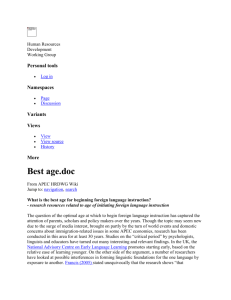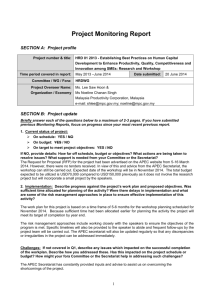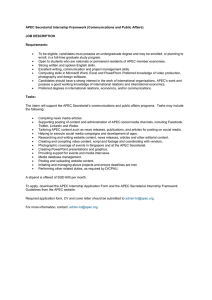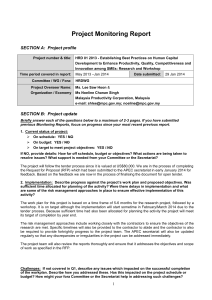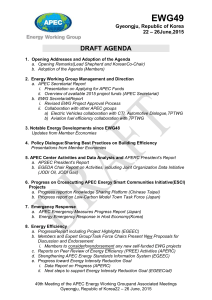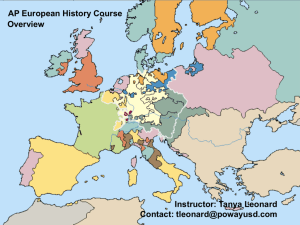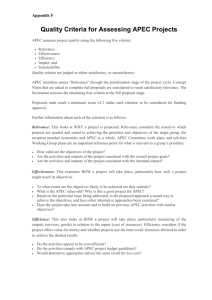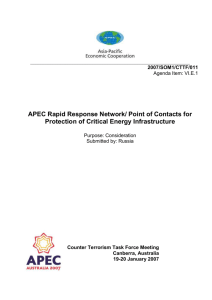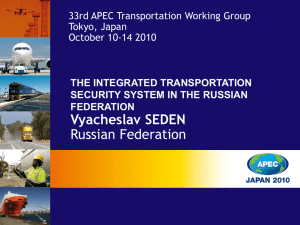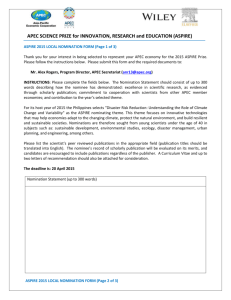1 - Asia-Pacific Economic Cooperation
advertisement
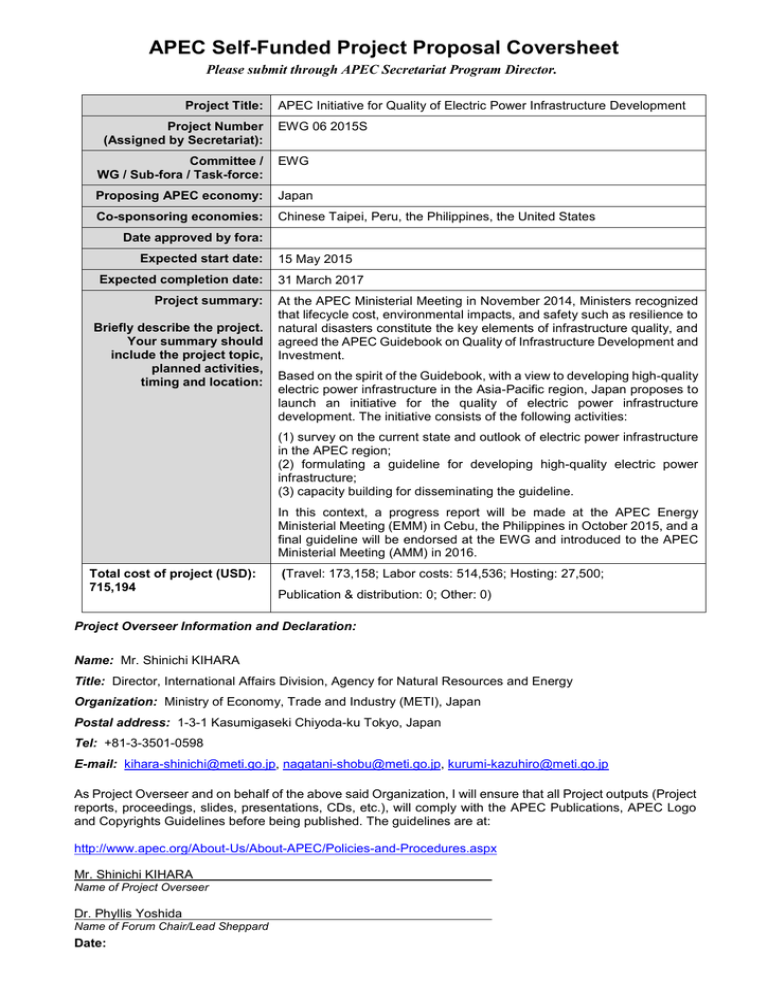
APEC Self-Funded Project Proposal Coversheet Please submit through APEC Secretariat Program Director. Project Title: Project Number (Assigned by Secretariat): APEC Initiative for Quality of Electric Power Infrastructure Development EWG 06 2015S Committee / WG / Sub-fora / Task-force: EWG Proposing APEC economy: Japan Co-sponsoring economies: Chinese Taipei, Peru, the Philippines, the United States Date approved by fora: Expected start date: Expected completion date: Project summary: Briefly describe the project. Your summary should include the project topic, planned activities, timing and location: 15 May 2015 31 March 2017 At the APEC Ministerial Meeting in November 2014, Ministers recognized that lifecycle cost, environmental impacts, and safety such as resilience to natural disasters constitute the key elements of infrastructure quality, and agreed the APEC Guidebook on Quality of Infrastructure Development and Investment. Based on the spirit of the Guidebook, with a view to developing high-quality electric power infrastructure in the Asia-Pacific region, Japan proposes to launch an initiative for the quality of electric power infrastructure development. The initiative consists of the following activities: (1) survey on the current state and outlook of electric power infrastructure in the APEC region; (2) formulating a guideline for developing high-quality electric power infrastructure; (3) capacity building for disseminating the guideline. In this context, a progress report will be made at the APEC Energy Ministerial Meeting (EMM) in Cebu, the Philippines in October 2015, and a final guideline will be endorsed at the EWG and introduced to the APEC Ministerial Meeting (AMM) in 2016. Total cost of project (USD): 715,194 (Travel: 173,158; Labor costs: 514,536; Hosting: 27,500; Publication & distribution: 0; Other: 0) Project Overseer Information and Declaration: Name: Mr. Shinichi KIHARA Title: Director, International Affairs Division, Agency for Natural Resources and Energy Organization: Ministry of Economy, Trade and Industry (METI), Japan Postal address: 1-3-1 Kasumigaseki Chiyoda-ku Tokyo, Japan Tel: +81-3-3501-0598 E-mail: kihara-shinichi@meti.go.jp, nagatani-shobu@meti.go.jp, kurumi-kazuhiro@meti.go.jp As Project Overseer and on behalf of the above said Organization, I will ensure that all Project outputs (Project reports, proceedings, slides, presentations, CDs, etc.), will comply with the APEC Publications, APEC Logo and Copyrights Guidelines before being published. The guidelines are at: http://www.apec.org/About-Us/About-APEC/Policies-and-Procedures.aspx Mr. Shinichi KIHARA Name of Project Overseer Dr. Phyllis Yoshida Name of Forum Chair/Lead Sheppard Date: Project Synopsis 1. Relevance: Why should APEC undertake this project? What problem or opportunity will the project address and why is it important? This project is related to the APEC Ministerial Meeting in Beijing, China in December 2014, where Ministers recognized that lifecycle cost, environmental impacts, and safety including resilience to natural disasters, constitute key elements of infrastructure quality, and welcomed the APEC Guidebook on Quality of Infrastructure Development and Investment. Energy demand is expected to increase in medium to long term, which leads to large investment in developing energy infrastructure. According to IEA, electricity demand in Southeast Asian countries is expected to increase constantly by 140% between 2012 and 2035, which leads to cumulative investment of about US$ 990 billion in power sector. In the meantime, it is necessary to develop energy infrastructure not in terms of short-term financial interest, but in terms of long-term and appropriate perspectives considering lifecycle cost, CO2 emissions reduction and resilience. Moreover, it is important to note that there are a lot of issues to be considered on electric power infrastructure such as: stable energy supply; best energy mix; geopolitical considerations; energy security; diversification of energy procurement; energy prices; emergency response measures; safety; regional development; and social problems. In light of the above-mentioned circumstances, it is necessary to promote high-quality electric power infrastructure in the APEC Region, and the Energy Working Group (EWG) is an appropriate forum for developing a guideline for developing high-quality electric power infrastructure. The guideline is not a general rule for electric power but needs to be developed in consideration of the fact that electric power is vitally important infrastructure with unique properties such as socio economic impacts, national involvement, diversity of power sources, and close relation with trade and environmental issues. 2. Objectives: Describe the 2-3 key objectives of the project. (e.g., to... create a framework...; ensure participants will be able to...; share experiences...; enhance understanding...; develop recommendations...; build interest...; revise strategies... etc.) To conduct survey on the current state and outlook of electric power infrastructure in the APEC region To formulate a guideline for developing high-quality electric power infrastructure To provide capacity building for disseminating the guideline for policy makers and concerned parties 3. Alignment: Describe how the project will help achieve APEC’s key priorities and meet your forum’s work-plan or medium-term plan. This project is expected to help each APEC economy to achieve “Sustainable” and “Secure Growth”, the two of five growth attributes of the APEC Leaders’ Growth Strategy adopted at the 2010 APEC Economic Leaders’ Meeting in Yokohama, 2010. This project is also expected to contribute to one of four priorities of APEC 2015, “Building Sustainable and Resilient Communities”, as well as the theme of the coming APEC Ministerial Meeting (EMM) in Cebu, the Philippines, “Towards an Energy Resilient APEC Community”. 4. Methodology: How do you plan to implement the project? In this section, address: Timeline: Project timelines and dates for key activities and deliverables The project will include the following tasks: Activity Deliverable Start research on the current state and outlook of electric power infrastructure in the APEC Region May 2015 Progress report at the EWG49 (Gyeongju, Korea) Power point slides June 2015 The 1st Workshop for sharing the importance of high-quality electric power infrastructure and discussing possible elements to be incorporated into a guideline for developing high-quality electric power infrastructure (Tokyo, Japan) Power point slides August 2015 Progress report at the EMM (Cebu, the Philippines) Power point slides or oral presentation October 2015 Start drafting the guideline for developing highquality electric power infrastructure Timing October 2015 Progress report at the EWG50 Power point slides November 2015 (TBC) Presentation for the draft guideline at the EWG51 Power point slides April 2016 (TBC) 2nd Workshop for discussing the draft guideline (Tokyo, Japan) Power point slides July 2016 Complete the draft guideline Final guideline August 2016 Endorsement of the final guideline at the EWG52 Final guideline October 2016 (TBC) Introduce the guideline to APEC Ministerial Meeting (AMM) Final guideline November 2016 (TBC) 3rd Workshop for capacity building (TBC) Power point slides December 2016 (TBC) 4th Workshop for capacity building (TBC) Power point slides January 2017 (TBC) 5th Workshop for capacity building (TBC) Power point slides February 2017 (TBC) Stakeholders: Beneficiaries and stakeholders (APEC & non-APEC) and how they will be engaged Beneficiaries and stakeholders of this project may include all APEC economies. Non-APEC governments, organizations or individuals are also possible beneficiaries. Previous projects/activities: If and how this proposal builds on the findings or lessons learned from previous projects/activities, while avoiding duplication Japan will try to make the best use of the results of APEC Self-Funded Project: Capacity Building of Infrastructure Development and Investment in APEC (CTI 02 2014S), where “APEC Guidebook on Quality of Infrastructure Development and Investment” was developed. Communication: How you plan to communicate the results or benefits of this project to others Progress reports will be made at EWG meetings. For further dissemination, the final report will be uploaded on APEC and APERC websites for public access.
